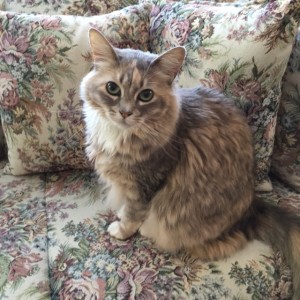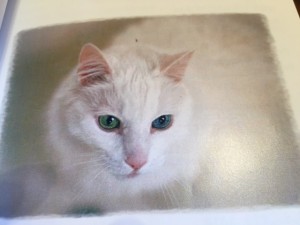 It’s widely known that pet cats are living longer—especially those who get regular veterinary care and are protected from elements and dangers outside the home. Sure, even a pampered cat can get sick. An indoor cat can meet with an accident or ingest something hazardous. I had a Persian swallow a needle once. Sophie ate metallic Christmas wrap bows and vomited vast amounts of blood one holiday season. When Lily was a mere kitten, Sophie knocked the cat tree over on top of her and she had a serious head injury. All of these things happened to extremely coddled totally inside kitties. And believe me, their accidents sure changed our ways. To this day, the 3-foot cat tree still lays on its side where the cats can play, but they can’t knock it over and hurt each other. We no longer use any ribbon or bows of any kind on gifts around here. And when I sew, I make sure no cats sit close to the pin cushion.
It’s widely known that pet cats are living longer—especially those who get regular veterinary care and are protected from elements and dangers outside the home. Sure, even a pampered cat can get sick. An indoor cat can meet with an accident or ingest something hazardous. I had a Persian swallow a needle once. Sophie ate metallic Christmas wrap bows and vomited vast amounts of blood one holiday season. When Lily was a mere kitten, Sophie knocked the cat tree over on top of her and she had a serious head injury. All of these things happened to extremely coddled totally inside kitties. And believe me, their accidents sure changed our ways. To this day, the 3-foot cat tree still lays on its side where the cats can play, but they can’t knock it over and hurt each other. We no longer use any ribbon or bows of any kind on gifts around here. And when I sew, I make sure no cats sit close to the pin cushion.
I don’t know if you’re like me, but I’ve been known to take a cat to the veterinarian before their symptoms are even recognizable to him or her. I know my cats so well that I see symptoms of illness even before the veterinarian can detect it. I’ve often had to take the cat home without treatment, only to have to make another appointment a few days later when the symptoms were full-blown.
Without diligent veterinary involvement Lily wouldn’t be as healthy as she appears at age 7. At an early age, she began displaying symptoms of kidney disease. She’s had many trips to the veterinarian for testing and monitoring. Today, she’s on a prescription food and she’s thriving.
Cats do come with disorders. They contract cancer and other serious diseases. When we adopt a cat, we take responsibility for all aspects of the animal, including and maybe foremost, their health.
Is your cat caught up with his or her immunizations? How does she look? Is her fur silky  and shiny, are her eyes bright, does she have a lot of energy? Or is he slowing down, looking tired, showing signs of stress? As cats age, things can change. The tired look, scraggly fur, dull eyes, might not be a natural sign of aging. It could be that your cat has developed a medical problem that needs attention. It’s common for older cats to experience kidney disease, for example. Adequate treatment can prolong, not only her life, but her quality of life.
and shiny, are her eyes bright, does she have a lot of energy? Or is he slowing down, looking tired, showing signs of stress? As cats age, things can change. The tired look, scraggly fur, dull eyes, might not be a natural sign of aging. It could be that your cat has developed a medical problem that needs attention. It’s common for older cats to experience kidney disease, for example. Adequate treatment can prolong, not only her life, but her quality of life.
Don’t short-change your cat. The veterinarian is her friend and, in some cases, her savior. So this would be a good time to evaluate the condition of your beloved household cat. If it’s been a while since she’s seen the veterinarian, make an appointment. Catch her up on her vaccines and arrange for all age-appropriate tests. The rewards might be a healthier feline friend who you’ll enjoy for a few or many more years.
BIG News Coming Soon
This month, we’re offering something for our Klepto Cat Mystery fans that has never been attempted here before. We’re ever so close to revealing our surprise of the season. So stay tuned here and follow the Klepto Cat Mystery blog so you won’t miss the bit reveal.





